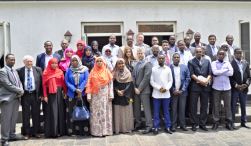 3 November 2016 – Somalia, in collaboration with World Health Organization (WHO), recently completed a joint external evaluation of the International Health Regulations (IHR 2005) to evaluate the country’s capacities to detect, prevent and respond to public health emergencies.
3 November 2016 – Somalia, in collaboration with World Health Organization (WHO), recently completed a joint external evaluation of the International Health Regulations (IHR 2005) to evaluate the country’s capacities to detect, prevent and respond to public health emergencies.
The evaluation workshop, from 17 to 21 October, in Entebbe, Uganda, examined the country’s current public health capacity across IHR technical areas – legislation, policy, finance, IHR coordination and advocacy, antimicrobial resistance, zoonotic diseases, food safety, biosafety and biosecurity, immunisation, national laboratory capacity, surveillance, reporting, workforce development, preparedness and emergency response operations.
The 5-day workshop was attended by WHO staff from regional and country offices, representatives from the US Centers for Disease Control and Prevention, the United Nations Institute for Training and Research, countries, including Finland, Belgium, Lebanon, Sudan and the United Kingdom, and 35 participants from Mogadishu and the northeastern and northwestern zones of Somalia, who represented a wide range of sectors, including the Ministries of Health, Commerce, the Interior and Justice and Constitutional Affairs, ports of entry authorities and academic institutions.
The joint external evaluation is the main component under IHR’s monitoring and evaluation framework, post-2015, for setting priorities to develop, maintain and sustain the required core capacities for every state party.
Each of the 19 technical areas covered by IHR was marked with 3 to 5 priority actions for capacity-building. The evaluation also covered points of entry and other IHR-related hazards for chemical events and radiation emergencies.
Using the joint evaluation tool, evaluators determined that Somalia has limited capacity in almost all of these technical areas. Somali officials said that the exercise had been an eye-opener for the country to build capacity for IHR requirements and pledged support from all the states to implement all priority actions. They agreed to set up an IHR high coordination committee and technical committees to assist in the implementation of IHR regulations.
The external evaluation team congratulated Somalia for their support and transparency in conducting the mission and advised that all sectors responsible for the implementation of IHR should develop a plan of action as soon as possible in order to implement the identified priority actions.


